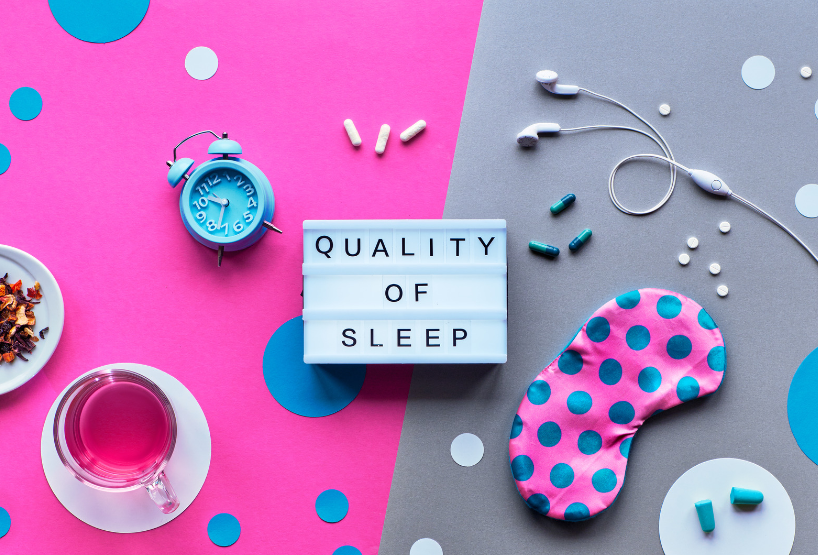Why you should improve sleep quality? Sleep plays a crucial role in our overall well-being and daily functioning.
However, many people struggle with poor sleep quality, which can negatively impact their physical health, mental clarity, and productivity. Having better sleep will help you to improve your mental health.
If you’re looking to enhance your sleep experience and wake up feeling refreshed, this article will provide you with practical tips and strategies to improve sleep quality.
From optimizing your sleep environment to adopting healthy habits, we’ll explore various ways to improve your sleep quality.
Why It’s Important To Improve Sleep Quality

Quality sleep is essential for our overall health and well-being. It allows our bodies to repair and rejuvenate, impacting our mood, cognitive function, and immune system.
Quality sleep is important to improve your body’s flexibility.
Unfortunately, many individuals struggle with sleep-related issues, such as insomnia or restless sleep.
However, by making some simple lifestyle changes and implementing effective strategies, you can significantly improve your sleep quality and wake up feeling more energized.
14 Tips for better sleep

Our expert tips for better sleep, and improving your health with our plan to get enough efficient sleep.
1. Create a Soothing Sleep Environment
Your sleep environment plays a vital role in the quality of your sleep. Getting good sleep will help you to improve your critical thinking skills. Make sure your bedroom is conducive to a restful night by following these tips:
- Keep your bedroom cool, quiet, and well-ventilated.
- Invest in blackout curtains or blinds to block out unwanted light.
- Choose a comfortable and supportive mattress.
- Use high-quality pillows that suit your sleeping position.
- Keep electronics, such as smartphones or tablets, out of the bedroom.
2. Stick to a Consistent Sleep Schedule
Maintaining a regular sleep schedule helps regulate your body’s internal clock, making it easier to fall asleep and wake up at the desired times. Follow these guidelines:
- Establish a consistent bedtime and wake-up time, even on weekends.
- Avoid napping too close to your bedtime.
- Create a relaxing pre-sleep routine to signal your body it’s time to unwind.
3. Limit Exposure to Electronic Devices
The blue light emitted by electronic devices can interfere with your sleep quality. Reduce your exposure to electronic screens before bed:
- Avoid using electronic devices, such as smartphones or laptops, for at least an hour before sleep. Keep your smartphone at a distance from your bed, that will help you to relax from all those notifications before sleep and after in the morning.
- If necessary, use blue light filters or night mode settings to minimize the impact.
4. Establish a Relaxing Bedtime Routine
A soothing bedtime routine can help you unwind and prepare your body for sleep. Consider incorporating the following activities into your routine:
- Take a warm bath or shower.
- Practice relaxation techniques, such as deep breathing or meditation.
- Read a book or listen to calming music.
5. Practice Regular Physical Exercise
Engaging in regular physical exercise can positively affect your sleep quality. Lateral Quickness is great physical exercise for better shape and clearing your mind. However, timing is crucial:
- Try to exercise earlier in the day, as exercising close to bedtime may make it harder to fall asleep.
- Aim for at least 30 minutes of moderate-intensity exercise most days of the week.
6. Maintain a Balanced Diet
Your diet can influence your sleep patterns. Consider the following dietary recommendations for better sleep:
- Avoid heavy meals, spicy foods, and caffeine close to bedtime.
- Consume sleep-promoting foods, such as almonds, kiwi, and herbal teas.
- Stay hydrated throughout the day but limit fluid intake before bed to prevent nighttime disruptions.
7. Manage Stress Levels
Stress and anxiety can significantly impact your sleep quality. Implement stress management techniques:
- Practice relaxation exercises, such as yoga or mindfulness meditation.
- Keep a journal to unload your thoughts and worries before bed.
- Seek support from friends, family, or a mental health professional if stress becomes overwhelming.
8. Avoid Stimulants Before Bedtime
Certain substances can disrupt your sleep patterns. Minimize or eliminate the following stimulants:
- Caffeine: Limit your intake and avoid consuming it close to bedtime.
- Nicotine: Avoid smoking or using nicotine products, especially before bed.
- Alcohol: While it may initially make you drowsy, alcohol can disrupt the later stages of sleep.
9. Ensure Comfortable Bedding and Pillows
Investing in high-quality bedding and pillows can significantly improve your sleep comfort. Consider these tips:
- Choose bedding made from breathable and hypoallergenic materials.
- Select pillows that provide adequate support for your neck and spine.
10. Invest in a Good Mattress
A supportive mattress is essential for a good night’s sleep. When choosing a mattress:
- Consider your preferred sleeping position (back, side, or stomach).
- Test different mattresses and seek professional guidance if needed.
11. Block Out Excessive Noise and Light
External stimuli can disrupt your sleep. Take measures to minimize noise and light disturbances:
- Use earplugs or white noise machines to block out unwanted sounds.
- Install blackout curtains or blinds to darken your room.
12. Utilize Relaxation Techniques
Incorporating relaxation techniques into your bedtime routine can promote better sleep. Nothing better for the skin texture than having a good 8-hour sleep. Try the following techniques:
- Progressive muscle relaxation: Tense and relax different muscle groups to release tension.
- Visualization: Imagine peaceful and calming scenes to relax your mind.
- Guided imagery or meditation: Follow audio recordings or apps to guide your relaxation.
13. Consider Natural Remedies
Certain natural remedies may support better sleep quality. Improving your sleep will help you to higher up your IQ.
Consult with a healthcare professional before trying any supplements or remedies:
- Melatonin: A hormone that helps regulate sleep-wake cycles.
- Valerian root: An herb commonly used as a sleep aid.
- Lavender: Use lavender essential oil or sprays to promote relaxation.
14. Seek Professional Help if Needed
If you’ve tried various strategies and still struggle with sleep issues, it may be beneficial to consult a healthcare professional or sleep specialist. They can assess your situation and provide personalized recommendations or treatments.
Managing Stress for Quality Sleep

To get quality sleep try to manage stress and relax before bedtime. Practice Good Sleep Hygiene will help you with your well-being.
Proper sleep hygiene may be quite beneficial for relaxation and stress management at night. You can assist produce peaceful sleep by doing the following:
- Only use the bedroom for sleeping and sex.
- Maintain a cool temperature in the bedroom.
- Choose a nighttime routine to help you relax before going to bed.
- After 3 p.m., avoid taking sleep.
- Avoid having tough chats before going to bed.
- Three hours before night, avoid stimulants such as nicotine and caffeine (caffeine lingers in the body for 5-7 hours).
- Avoid using a screen for at least one hour before going to bed.
- Large meals should be avoided several hours before night.
Dealing with Restless Leg Syndrome at Night
Restless legs syndrome, also known as Willis-Ekbom illness, is a common nervous system ailment characterized by an intense, irrepressible need to move the legs.
It can also induce a creeping or crawling feeling in the feet, calves, and thighs. The feeling is frequently exacerbated in the evening or at night. The arms are occasionally affected as well.
Restless legs syndrome is also linked to the involuntary jerking of the legs and arms, a condition known as periodic limb movements in sleep (PLMS).
Some people have restless legs syndrome symptoms very sporadically, while others experience them daily. The severity of the symptoms might range from minor to severe. Restless legs syndrome may be extremely distressing and impede a person’s daily activities in severe situations.
How to treat restless legs syndrome
To have a good sleep you should fix some issues you have, some people suffer from restless legs syndrome we will guide you to great treatment for restless legs
Adopting Good Sleep Habits
One of the key factors in managing restless legs syndrome is establishing and maintaining good sleep habits. Following a regular bedtime ritual helps signal to your body that it’s time to sleep, promoting a more restful night. Consider the following tips to enhance your sleep routine:
- Establish a Consistent Bedtime Ritual: Create a soothing routine before bed, such as taking a warm bath or practicing relaxation techniques like deep breathing or meditation.
- Maintain Regular Sleep Hours: Aim to go to bed and wake up at the same time every day, even on weekends. This helps regulate your body’s internal clock and promotes better sleep quality.
- Limit Alcohol and Caffeine Consumption: Avoid consuming alcohol and caffeinated beverages, such as coffee and energy drinks, especially in the evening. These substances can disrupt your sleep patterns and worsen RLS symptoms.
Quitting Smoking
If you are a smoker and experience restless legs syndrome, quitting smoking may significantly improve your symptoms. Smoking can harm circulation and blood flow, exacerbating RLS discomfort. By eliminating smoking from your life, you can enhance your overall well-being and potentially alleviate the severity of RLS symptoms.
Regular Exercise during the Daytime
Engaging in regular physical exercise during the daytime can be highly beneficial for individuals with restless legs syndrome. Exercise helps improve circulation, reduce stress, and promote better sleep. Consider incorporating the following activities into your daily routine:
- Aerobic Exercises: Brisk walking, jogging, cycling, or swimming are excellent choices for boosting circulation and promoting overall fitness. Aim for at least 30 minutes of moderate-intensity aerobic exercise most days of the week.
- Stretching and Yoga: Gentle stretching exercises and yoga poses can help relax your muscles and relieve tension. Incorporate stretching routines or join a yoga class to experience the benefits.
- Strength Training: Include strength training exercises, such as weightlifting or resistance band workouts, to build muscle strength and enhance overall physical health.
Medical Treatment Options
In more severe cases of restless legs syndrome, lifestyle changes alone may not provide sufficient relief. If your symptoms persist or worsen, it may be necessary to explore medical treatment options. Two common approaches include:
- Medication for Dopamine and Iron Regulation: Certain medications can help regulate dopamine levels and address iron deficiencies in the body, which are often associated with restless legs syndrome. Consult a healthcare professional to discuss the most suitable medication options for your specific condition.
- Iron Supplements for Iron Deficiency Anemia: When restless legs syndrome is caused by iron deficiency anemia, iron supplements may be recommended. These supplements can help replenish iron stores in the body and alleviate RLS symptoms. However, it’s important to consult a healthcare provider before initiating any supplementation regimen.
Related: How to improve circulation in the legs while sleeping?
Conclusion
Improving your sleep quality is essential for your overall well-being.
By implementing the tips and strategies mentioned in our guide on how to improve sleep quality, you can create a better sleep environment, adopt healthy habits, and manage stress levels effectively.
Remember, finding the right combination of techniques that work for you may take time, but the benefits of quality sleep are well worth the effort.
FAQs
The recommended amount of sleep for adults is typically 7 to 9 hours per night, although individual needs may vary.
Exercising close to bedtime can increase alertness and make it harder to fall asleep. It’s best to schedule physical activity earlier in the day.
If you’re having trouble falling asleep, try relaxation techniques such as deep breathing or reading a book. Avoid staring at screens or engaging in stimulating activities.
It’s best to consult with a healthcare professional before taking any sleep supplements. They can provide guidance based on your individual needs and health conditions.
Waking up during the night can be a sign of an underlying sleep disorder. If it persists, consider seeking advice from a healthcare professional to identify the cause and explore potential solutions.
Restorative sleep is necessary for optimal physiological and mental performance. Our internal clock, the circadian rhythm, governs our sleep-wake cycle and impacts mood regulation. Circadian rhythm disruptions can cause weariness, irritation, and even melancholy.

